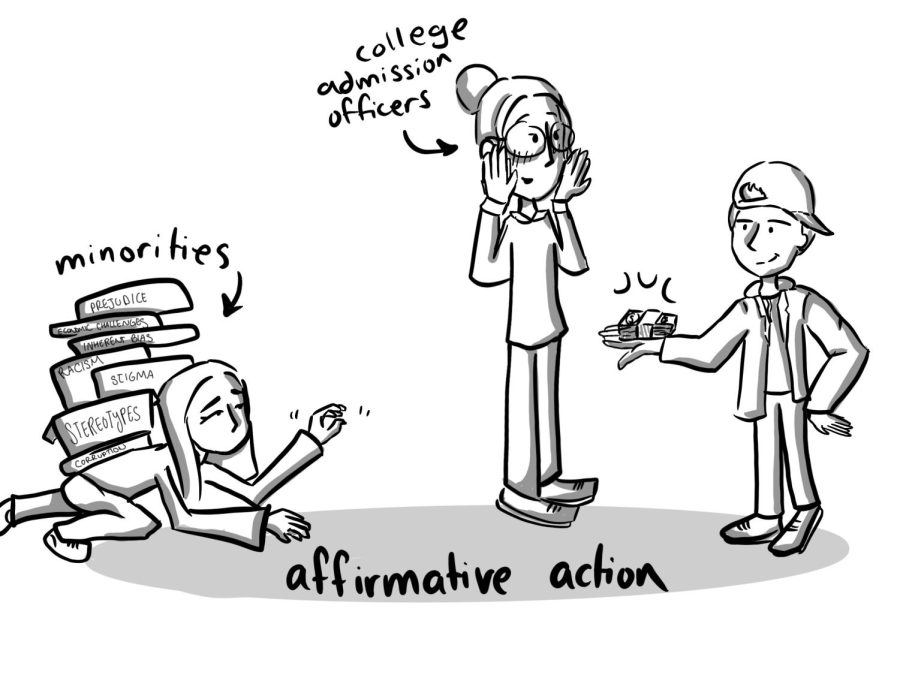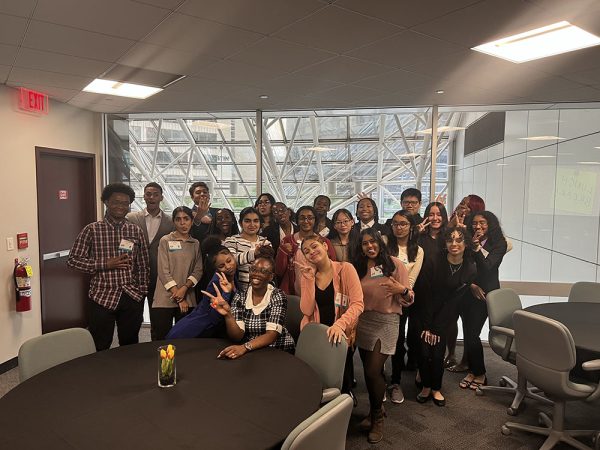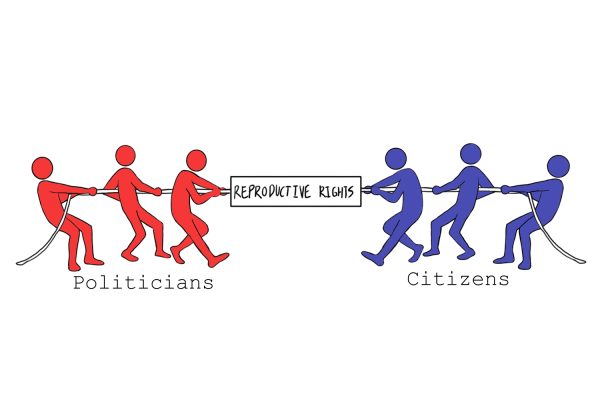Supreme Court Considers Fate of Affirmative Action
While the Supreme Court considers ending affirmative action, 56% of nation’s top universities consider legacy in the admissions process.
The Supreme Court is set to decide in June on the precedent of race considerations in the higher education admissions process in the cases Students for Fair Admissions (SFFA) v. University of North Carolina at Chapel Hill and SFFA v. President and Fellows of Harvard College.
Higher education institutions are currently permitted to consider an applicant’s race among many other variables as a part of the admissions process. This is a form of affirmative action, a selection process designed to eliminate or reduce discrimination, most commonly at places of education or employment.
However, nonprofit organization Students for Fair Admissions (SFFA) is currently suing Harvard College, along with The University of North Carolina at Chapel Hill under the claim that using race as a factor in the college admissions process is “unfair, unnecessary, and unconstitutional.”
The history of affirmative action in the United States dates back to 1964, when President Lyndon B. Johnson’s administration established the roots of affirmative action in the Voting Rights Act of 1964, along with an executive order in 1965.
“You do not take a person who, for years, has been hobbled by chains and liberate him, bring him up to the starting line of a race,” Johnson said in a speech addressing the matter.
Affirmative action in the form of race-conscious admissions has been challenged numerous times, including in 2003 when the Court contended the constitutionality of affirmative action in Grutter v. Bollinger. The Court again upheld the use of affirmative action in the 2016 case Fisher v. University of Texas. In 2022, the Court agreed to hear two cases that challenge Grutter v. Bollinger.
The Supreme Court currently has a conservative majority, which, according to many sources, is likely to rule in favor of ending affirmative action in higher education.
It cannot be reasonably argued that in the name of diversity, the daughter of an Asian working-class immigrant should be penalized in her efforts to gain admission to a competitive university over the daughter of a successful White, Hispanic or African-American professional.
— Edward Blum, President of Students for Fair Admissions
Edward Blum, the President of Students for Fair Admissions, describes the rationale behind the lawsuits.
“The common element in each lawsuit is the claim that both schools racially gerrymander their admitted freshman class by illegally raising the bar for certain racial and ethnic groups, while lowering the bar for others,” he wrote in an email. “SFFA asserts these practices are outside the narrow bounds the law allows for using race or ethnicity in college admissions.”
Alternatively, Case Western Reserve University Vice President of the Office for Inclusion, Diversity and Equal Opportunity Robert L. Solomon argues that diversity benefits students, colleges and universities.
“All the research supports the notion that diverse teams, companies and entities are the most innovative, productive and successful,” he wrote in an email. “We live in a pluralistic world and the best preparation universities can provide to students are the skills to thrive in a multicultural world. Exposing students to diverse faculty staff and students, as well as perspectives, ideas and scholarship from a broad cross-section of sources, is a core foundation to such success.”
The debate about affirmative action is not just being discussed on a national level. Beachwood students are also divided on the issue, as students from both sides of the argument hold strong opinions on the topic.
Freshman Lyndia Zheng feels that affirmative action does not always benefit the students who need it most.
“I believe that affirmative action started with good intentions for creating more fair college admissions, and I think there is a need or place for something similar,” she wrote in an email. “However, I think that now, the system is a little more messed up.”
“As an Asian-American student without any extremely special factors when it comes to a college application, you always hear stories of great students who check all the boxes and simply don’t make it in,” she added. “This could be luck, maybe there was just someone better, but it seems that instead of benefiting underprivileged minorities, it has warped into only benefitting middle and upper class minorities.”
In contrast, sophomore Eliana Worku discusses how she believes students benefit from affirmative action.
“Affirmative action allows for diversity in student bodies, which is essential in creating an inclusive environment where there are a variety of learning experiences regarding culture and racial background,” she wrote in an email. “Historically, people of color, specifically African Americans, faced many difficulties when it came to attending a top-tier university. Affirmative action, in a way, almost repairs the effects of the past by having more intentional evaluations when it comes to applicants.”
However, according to a poll conducted by Pew Research Center in 2022, 74% of Americans do not believe that race or ethnicity should be factors in the college admissions process. This includes 79% of White adults, 68% of Hispanics, 63% of Asians, and 59% of Black adults.
We live in a pluralistic world, and the best preparation universities can provide to students are the skills to thrive in a multicultural world. Exposing students to diverse faculty staff and students, as well as perspectives, ideas and scholarship from a broad cross-section of sources, is a core foundation to such success.
— Robert L. Solomon, Vice President of the Office for Inclusion, Diversity and Equal Opportunity at Case Western Reserve University
College admissions consultant Lisa Mayers illustrates the complexity of the situation, addressing both sides of the debate.
“Affirmative action allows colleges and universities to serve a wider spectrum of students,” she wrote in an email. “This allows higher education institutions the chance to engage students from a wide range of cultural, ethnic, and socioeconomic backgrounds. Our education system, frankly every system in this country, is steeped in systemic racism. One opportunity to level the playing field is affirmative action.”
“Affirmative action can hurt students when there are race-based quotas for admission,” she continued. “Historically, Jewish students were limited in their higher education enrollment because of quotas. Today, Asian-American and Asian (international) students are often held to a higher standard. This is equally problematic.”
Blum also addressed the past discrimination against Jewish students in the college admissions process.
“Harvard has a long and ugly history of discriminating against high-achieving minorities,” he wrote. “As many historians have detailed, years ago, Harvard’s leadership believed it had too many Jews on campus because almost a quarter of all Harvard freshmen were Jewish. Thus, “holistic” admissions were concocted to limit the number of Jews admitted.”
If the Supreme Court were to rule against the use of race in college admissions this June, this could have immense effects on individuals across the nation, as universities would have to find an alternative to affirmative action. Many believe that this could lead to a race-neutral admissions process. However, this could mean many different things.
Mayers describes what she believes race-neutral admissions would look like.
“I guess the most obvious way these race-neutral admissions would be implemented is by removing any and all questions about race/ethnicity from the Common App and other applications,” she wrote. “If colleges are prevented from asking these questions, then a student’s background would be suppressed when admissions decisions are made.”
Worku describes how she believes that race neutral admissions would hurt students of specific minority groups.
“Race-neutral admissions would only worsen the underrepresentation that many students of color face, specifically African American and Latinx students,” she wrote.“Not having college admission officers be intentional while assessing applications would only allow for implicit racial bias to take hold in the evaluation process, and that would only hurt minorities even more. Race-conscious admission policies and the priority of diversity are all crucial factors in promoting equity in education.”
However, Blum believes that race-neutral admissions could increase diversity, and that colleges such as UNC chose to reject this.
“In our lawsuit against the University of North Carolina, SFFA exposed that the university is violating the Equal Protection Clause of the 14th Amendment and Title VI of the Civil Rights Act by rejecting all reasonable race-neutral alternatives to racial admissions preferences even if those alternatives would increase overall student body racial diversity,” he wrote.
If affirmative action protections are removed, I think legacy preference must immediately be banned.
— College Admissions Consultant Lisa Mayers
Apart from this, banning race-conscious admissions also presents another possible problem in college admissions: legacy. The use of legacy in college admissions has also come under recent criticism, as many universities are currently permitted to factor legacy into a student’s admissions process.
According to a 2020 Wall Street Journal, 56% of the country’s top 250 universities consider legacy during the admissions process. Additionally, according to The Los Angeles Times, “From 2010 to 2015, Harvard’s admission rate for legacies was 34%, while its admission rate for non-legacies was 6%. In other words, legacy applicants are nearly six times more likely to be admitted than applicants who do not have a Harvard-educated parent.”
Blum expressed an interest in eliminating legacy preferences as well.
“SFFA has demonstrated that eliminating legacy preferences, preferences for the children of faculty and staff and preferences for the children of wealthy donors while giving a greater weight to students from economically disadvantaged backgrounds will produce an individualized and diverse student body without treating students differently by race,” he wrote. “It cannot be reasonably argued that in the name of diversity, the daughter of an Asian working-class immigrant should be penalized in her efforts to gain admission to a competitive university over the daughter of a successful White, Hispanic or African-American professional.”
Mayers also discussed her favor for eliminating legacy preferences.
“If affirmative action protections are removed, I think legacy preference must immediately be banned. Legacy-based admission decisions are just as problematic,” she wrote.
According to The New York Times, this may actually happen.
“If the court ends or rolls back the widely used practice of considering race in selecting students, as many experts expect, the ruling could prompt a reconsideration of legacy applicants. Explicitly favoring the children of alumni — some of whom would be competitive applicants regardless because of socioeconomic advantages — would become harder to defend if racial preferences are no longer allowed.”

Taia Menefee (she/her) started writing for the Beachcomber in fall of 2021 during her freshman year. She is interested in covering nationwide issues...

Anah Khan (she/hers) started writing for the Beachcomber in 2021. She is interested in covering new organizations and programs in BHS and writing opinion...

















